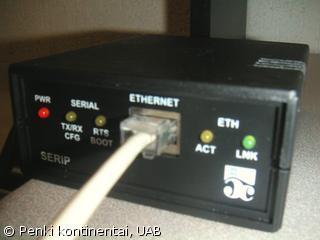At the “Infobalt 2003” exhibition Penki kontinentai, UAB will present a universal device family “SERIP”.

At the
“Infobalt 2003” exhibition at the stand Nr S1.14
Penki kontinentai, UAB Internet and telecommunications centre will present a universal device family “SERIP”. These compact data management devices will help you to transmit data operatively, monitor significant changes. You will safe money and time. These are the first devices of such kind in Lithuania, and they do not have analogues yet. Two types of “SERIP” are being produced: adapter “SERIP DATA” and changes’ monitoring device “SERIP TERMO”.
“SERIP DATA”
“SERIP DATA” device gives opportunity to use COM port as a part of Ethernet network. Majority of the machines – banking equipment, POS machines, bar code readers, lottery terminals, counters – have got COM port through which they may be connected to one device only. If we want to expand the usage of those devices, to connect them to the local network or Internet, we will need Ethernet connection. Connected to one of the mentioned devices “SERIP” gives opportunity to use COM port as a part of Ethernet network. Via the COM port the data is transmitted about 100 times slower than via the Ethernet connection. Furthermore, having connected SERIP, the data transmission may be be-directional.
This device will help the bankers, power-engineering specialists, tradesmen, health care staff, network service providers show business and other field’s representatives to expand activities, diminish expenses and safe time.
“SERIP THERMO”
“SERIP THERMO” device is used for the monitoring of temperature and voltage changes. Up to 8 thermometers may be connected to the device. Maximal and minimal temperatures for each are determined. If temperature changes are observed, they are not only shown at the screen, but also send a warning message via e-mail and SMS to the responsible person. Detailed temperature changes graphic may be view at the local or web page.
A chip, which is as small as the nail can proceed all the functions of the thermometer. Such thermometers may be sewed to the patients’ blanket and connected to the monitoring device (at the distance up to 100 meters). Several thermometers and voltage sensors may be connected to one “SERIP THERMO” device. Thus, the device would inform about electricity disappearance.
The device is perfect for the maintenance of the servers, refrigerators, manufacture equipment for operation of which a certain temperature is important, as well as for the patients’ care.